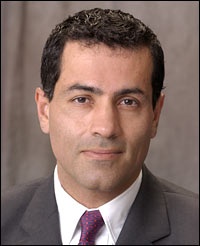KEY WEST, Fla. _ I’m here at the biannual Faith Angle conference sponsored by the Pew Forum on Religion & Public Life. I know, I know … Key West is a tough place to be in December, but somone’s gotta do it.
We’ve all heard about the fighting between Shia and Sunni Muslims across the Middle East, but what does that really mean? Vali Nasr, senior fellow at the Council on Foreign Relations (and Tufts and Harvard) offered a quick primer that, while not exhaustive, seemed pretty helpful to me:
-For Sunni, think of Saudi Arabia. For Shia, think Iran. They’re both battling for influence in Iraq, which Nasr says is really a proxy for a larger tug-of-war between the largely Sunni western end of the Middle East (Egypt, Palestine, Saudi Arabia) and the more Shia eastern end (Iran, Afghanistan, Pakistan).
–The Sunni/Shia split is almost as old as Islam itself (it was originally a debate over who should succeed the Prophet Muhammad), but both lay claim to original orthodoxy. “They believe they got it right, the other guys got it wrong. One is not a reformation of the other,” Nasr said.
-Yes, they both read the same Quran, but “they don’t agree on the interpretation of a single page of it.” Not unlike the Protestant/Catholic divide, only more raw.
-Sunnis and Shiites both pray to Allah, but differently. Sunnis stand praying with their hands clasped together in front; Shia Muslims stand praying with their hands at their sides.
-Sunnis and Shiites differ on points of law. “You’re not a Muslim by faith, you’re a Muslim by observance. Observance is determined by law, and law is determined by clerics,” Nasr said. Shia law is more open-ended; the Ayatollah is always interpreting. Sunni law, on the other hand, is closed. There is no tradition of (legal) interpretation to create new laws.
-Shiites place a special influence on shrines and martyrs, much like Catholics. “They believe their prayers will be rewarded,” Nasr said. “There is a passionate and direct relationship with these places and people.”





